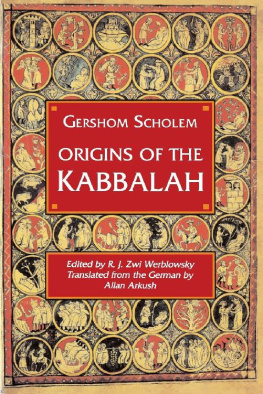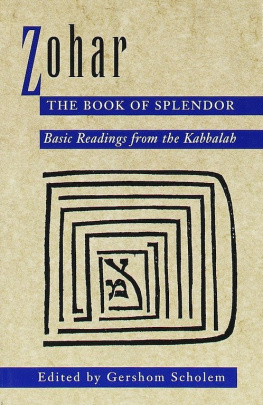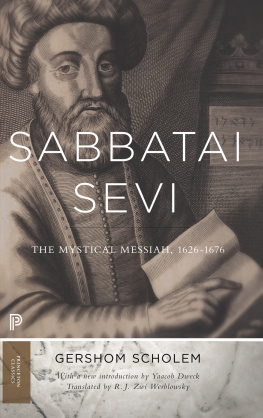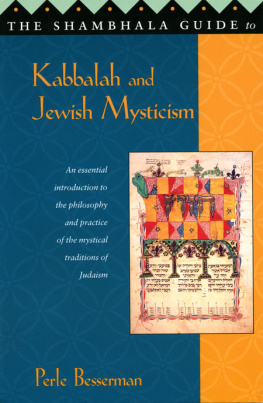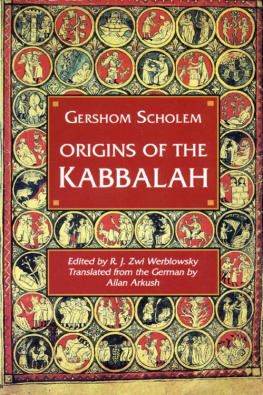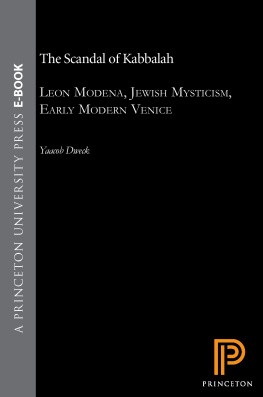ORIGINS OF THE KABBALAH

ORIGINS OF THE KABBALAH

GERSHOM SCHOLEM
edited by
R. J. ZWI WERBLOWSKY
translated from the German by
ALLAN ARKUSH

THE JEWISH PUBLICATION SOCIETY
PRINCETON UNIVERSITY PRESS
Originally published in German under the title Ursprung und Anfnge der Kabbala
Copyright 1962 by Walter de Gruyter & Co. Berlin
English translation copyright 1987 by The Jewish Publication Society
First English edition All rights reserved
Manufactured in the United States of America
Library of Congress Cataloging in Publication Data
Scholem, Gershom Gerhard, 18971982
Origins of the Kabbalah.
Translation of: Ursprung und Anfange der Kabbala.
Bibliography: p.
Includes index.
1. CabalaHistory. 2. Sefer ha-bahir. I. Werblowsky, R. J. Zwi (Raphael Jehudah Zwi), 1924. II. Title.
BM526.S363513 1987 296.16 867381
ISBN 0-691-07314-7
ISBN 0-691-02047-7
Princeton University Press books are printed on acid-free paper and meet the guidelines for permanence and durability of the Committee on Production Guidelines for Book Longevity of the Council on Library Resources
Third printing, and First Princeton Paperback printing, 1990
http://press.princeton.edu
Designed byADRIANNE ONDERDONK DUDDEN
15 14 13 12 11 10 9 8

Contents

Sources
| Ar.Or. | Archiv Orientalni |
| HTR | Harvard Theological Review |
| HUCA | Hebrew Union College Annual |
| JAOS | Journal of the American Oriental Society |
| JBL | Journal of Bilical Literature |
| JJS | Journal of Jewish Studies |
| JQR | Jewish Quarterly Review |
| JRAS | Journal of the Royal Asiatic Society |
| MGWJ | Monatsschrift fr die Geschichte und Wissenschaft des Judentums |
| PAAJR | Proceedings of the American Academy for Jewish Research |
| REJ | Revue des tudes juives |
| RHR | Revue de lHistoire des Religions |
| ZMRW | Zeitschrift fr Missionskunde und Religionswissenschaft |

Editors Preface
It is idle to question which of a great scholars great works is his greatest. In the case of Grershom Scholem, also the opera minora, articles, and essays were great. But three works stand out not only by virtue of their size, but also by virtue of their impact. Each exhibits different qualities. Major Trends in Jewish Mysticism (1st ed. 1941) is the first great and still classic attempt to view the whole history of Jewish mysticism in one wide sweep, combining synthetic power with analytical precision and attention to philological detail. Sabbatai Sevi: The Mystical Messiah (original Hebrew ed. 1956; revised English version 1973) became a best seller not only because of the fascination with its exotic subject matter. Rarely before had such erudition, quantity and breadth of the sources, minute textual analysis, and profound historical insight been brought to bear on a relatively shortbut nevertheless bizarre, spectacular, and, withal, significantepisode in Jewish history (and the history of messianic movements in general for that matter). Yet in many ways Ursprung und Anfnge der Kabbalah (1962) is the most impressive of all, for here Scholem dealt with a major yet enigmatic phenomenon in the history of Jewish spirituality. The very specific form of Jewish mysticism (or mystical theosophy) known as Kabbalah appeared suddenly, as if out of the blue, in the late Middle Ages. What were its antecedents? Was it really as ancient as it purported to be? Exactly where, when, and in what circles did it originate? What were the influences (Oriental, Western, philosophical, gnostic, early, late) that went into its making? The wealth of source material marshaled, the penetrating philological accuracy with which it was analyzed, and the scope of historical insight with which it was evaluated all made this study, first published in German in 1962, a maximum opus.
The book was a first synthesis of research that had been presented as a draft, as it were, in a small Hebrew book Reshith ha-Qabbalah (1948). The author, in his Preface (see p. xv), describes his German publication of 1962 as more than double the size of the earlier Hebrew publication. In a letter written in the summer of 1961 from London to his lifelong friend S.Y. Agnon, the Hebrew writer and Nobel laureate, and preserved in the Agnon Archive at the National and Hebrew University, Scholem referred to his fruitful year, praised the cold London winter that had kept him indoors and hard at work, and mentioned that the size of the book he was finishing was about three times that of the Hebrew publication. In actual fact the Hebrew book had 262 pages octavo size, whereas the German publication of 1962 ran to 464 pages quarto size. After the publication of Ursprung, research continued with growing intensity, and in due course Scholems graduate and postgraduate students began to contribute to it in increasing measure. Additional sources came to light, necessitating a reexamination and reevaluation of the known sources and texts. Scholems developing views were voiced in his course lectures at the Hebrew University, and some of those notes were subsequently edited by his students and circulated in stenciled copies. Thus his lecture courses on The Origins of the Kabbalah and the Book Bahir (1961/1962) and on The Kabbalah in Provence: the circle of RABAD and his son R. Isaac the Blind (1962/1963) were edited by his student, now Professor Rivkah Schatz-Uffenheimer, and published in 1966. The lecture course on The Kabbalah of the Book Temunah and of Abraham Abulafia (1964/1965) was edited by another student, now Professor J. Ben-Shlomoh, and published in 1965. A French translation of Ursprung appeared in 1966 (Les origines de la Kabbale); although it made the work accessible to the French reader, it did not add to the state of knowledge as represented by the original.
Several years ago the Jewish Publication Society conceived the happy idea of bringing out an English version of this seminal work. The translator, Dr. Allan Arkush, who rendered the German original into English, had to struggle with the extreme difficulty of the subject matter and the equally extreme difficulty of the authors German style. And when the translation was ready a new problem became apparent. The accumulation of the results of more than twenty years of intensive research rendered very questionable the value of a simple reprint (albeit in English) of a study reflecting the state of knowledge in 1962. The editor therefore decided to bring the book up-to-date.
But here the difficulty was compounded by the death of Professor Scholem early in 1982. By contrast, in the late sixties, when the present editor translated and to some extent rewrote
Next page
